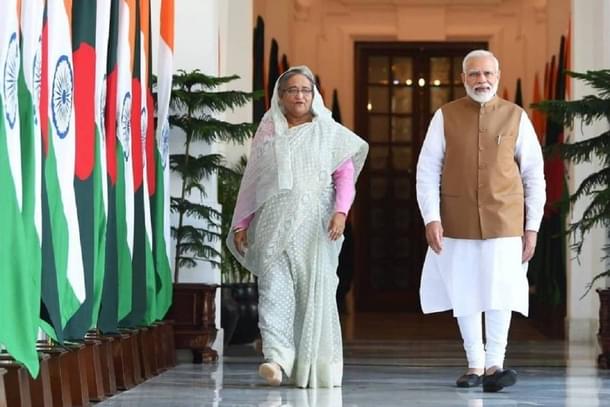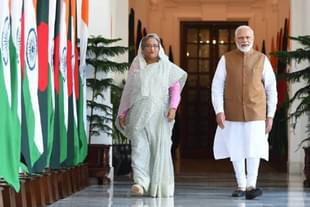Foreign Affairs
Bangladesh Elections: How India Is Helping Sheikh Hasina Fend Off Pressure From Western Nations To Step Down
Jaideep Mazumdar
Nov 11, 2023, 03:06 PM | Updated 02:50 PM IST
Save & read from anywhere!
Bookmark stories for easy access on any device or the Swarajya app.


Bangladesh Prime Minister Sheikh Hasina has successfully resisted tremendous pressure from the US, UK and the European Union (EU) to step down and make way for a neutral caretaker regime.
The Bangladesh Nationalist Party (BNP) and other Opposition parties, including communists, socialists and Islamists, have been demanding that the forthcoming polls to the Jatiya Sansad (Bangladesh’s Parliament) be conducted under a neutral caretaker government. Only such a government, they contend, can ensure free, fair and participatory elections.
The BNP, which is the principal opposition party in Bangladesh, had indicated to the Western nations a few months ago that it would boycott the elections, like it had done in 2014, if they are not held under the supervision of a neutral caretaker government.
The US, UK and some EU member states had started taking an ‘unhealthy’ interest in the Bangladesh elections since the middle of this year.
Envoys of these countries had started meeting Opposition leaders as well as ruling Awami League (AL) leaders to discuss the conduct of ‘free, fair and participatory elections’. They also held many meetings with the Election Commission (EC) to discuss the conduct of the elections due in early January next year.
It was at these meetings with the envoys of the Western nations and delegations from those countries that had visited Bangladesh over the past seven months that the BNP explicitly stated its intentions of boycotting the elections if its demand (for elections held under supervision of a caretaker government) is not met.
But AL leaders also made it clear to the envoys and delegations that the Opposition demand would not be met under any circumstance. AL leaders argued that the system of conducting elections under a caretaker government was abolished through the 15th constitutional amendment passed by the Jatiya Sansad in 2011 and there was no way it would be reintroduced.
Prime Minister Sheikh Hasina’s close aides, who met representatives of the Western nations over the past few months, also assured the latter that elections would be free and fair and it was up to the BNP and other opposition parties to participate. Hasina’s aides contended that holding elections under the incumbent government is a global practice and Bangladesh cannot be asked to be an exception.
But the US, UK and EU, in their misplaced zeal to promote Western-style democracy, bought into the BNP’s stand that free and fair elections would not be possible under the AL government and the only way to ensure a level playing field was for the government to step down.
The Western nations started applying pressure on Sheikh Hasina to step down. They correctly estimated that if Sheikh Hasina does not accommodate the BNP’s demand and continues in power, Bangladesh would be engulfed in widespread violence.
An assessment made by an EU representative who visited Bangladesh in August this year stated that rejection of the ‘core demand’ of the BNP (for Sheikh Hasina to step down in favour of a caretaker government) will result in intense street protests by the BNP and other opposition parties that could lead to violence.
Similar assessments were also made by envoys of the US, UK and other Western nations. According to the AL leadership, they presented a doomsday scenario to the leadership of their respective countries.
Violent street protests, assessed the envoys and visiting delegations of Western nations, would invite a harsh crackdown by the government, mass arrests of Opposition politicians and workers. That would vitiate the poll process and lead to an election boycott by the Opposition parties, thus reducing the elections to a meaningless exercise.
“Pressure started mounting on our leader and Prime Minister (Sheikh Hasina) from Western capitals to concede the opposition demand and step down for the sake of making the polls participatory, free and fair,” said AL general secretary Obaidul Qader.
Qader, who is also the road transport minister, told Swarajya that the government and the (ruling) party were very clear that the Opposition’s “unreasonable” demand would not be met and all pressure from foreign capitals would be resisted.
As pressure started mounting from the Western capitals, Dhaka turned to New Delhi for help. Sheikh Hasina personally spoke to Prime Minister Narendra Modi, and discussions were also held between the foreign policy establishments of both the countries.
New Delhi, which has repeatedly said that elections are an internal matter of Bangladesh, assured Dhaka that it would stand by the AL leadership.
India’s political leadership, as well as top officials of the Ministry of External Affairs (MEA), took up this issue during their interactions at various levels with their counterparts in the US, UK and EU.
A number of senior MEA officials told Swarajya that India explained the political scenario in Bangladesh to the Western nations and elaborated on the links between the BNP and radical Islamist forces.
Even at the just-concluded ‘2+2’ dialogue (between the US and India foreign and defence ministers) at New Delhi, India reiterated its stand on Bangladesh elections.
At a press briefing at the end of the ‘2+2’ dialogue, (India’s) foreign secretary Vinay Mohan Kwatra said: “We did discuss very extensively regional issues and as far as Bangladesh is concerned, we shared our perspective very clearly”.
It is learnt that Foreign Minister S Jaishankar told the US Secretary of State Antony Blinken that “unwelcome interference” in the poll process in Bangladesh would jeopardise regional security and stability and would not be in the US’ long term interests.
India also explained to its friends in the West that interference in Bangladesh’s elections would boomerang. Such interference and pressure would result in Dhaka stepping into China’s embrace to ward off Western pressure.
China’s ambassador to Bangladesh, Yao Wen, has been asserting at various forums that parliamentary elections are an internal matter of Bangladesh and no country has the moral right to intervene. His statements have been welcomed by AL leadership.
China’s position mirrored India’s stance, which has been explicitly and repeatedly articulated by Pranay Verma, the Indian High Commissioner to Dhaka. Verma has met the AL leadership, including Prime Minister Hasina, a number of times over the past few months to assure them of New Delhi’s firm stand on the issue.
Emboldened by New Delhi’s firm support, the AL leadership has successfully warded off pressure from the Western nations to concede the Opposition’s core demand.
New Delhi’s intervention with the Western nations on Dhaka’s behalf has also started showing results, said Bangladesh Information Minister Dr Hasan Mahmud.
Over the last few weeks, the Western nations have watered down their earlier rigid stand that Prime Minister Hasina ought to concede the Opposition’s demand to step down “for the sake of democracy and free and fair elections”.
In recent weeks, Western envoys have only urged the government to ensure that elections are held in a peaceful atmosphere and in a free and fair manner.
India’s strong support also resulted in Bangladesh’s political leadership mustering up courage to publicly snub the Western nations.
Top AL leaders have openly voiced their disapproval of the utterings of the envoys of Western countries regarding the forthcoming elections in the country and have asked them to lay off.
A glaring instance of this is the unprecedented rebuff delivered to the US ambassador Peter Haas by Prime Minister Sheikh Hasina. Reacting to a statement by Haas that the AL leadership should hold a dialogue with the BNP leadership, Hasina bluntly said she would speak to (BNP chairperson) Khaleda Zia after (US) President Joe Biden holds talks with (former President) Donald Trump.
“Such a snub would have been unimaginable in the past. But with India’s strong backing, and secure in the knowledge that China would also help in warding off Western pressure, the Awami League leadership is now bold enough to disregard Western pressure,” said senior Bangladesh journalist Shahryr Alam Hasan.
Hasan, who has authored a few books on political developments and recent history of his country, told Swarajya that India’s recent actions like withdrawing diplomatic cover to Canadian diplomats and the way it has dealt with Canada over the ‘Nijjar killing’ has “inspired” Bangladesh.
“India, through its own conduct and by assuring Bangladesh of its strong support, has busted the myth that the West is all powerful and smaller nations must honour the wishes of Western nations. India has displayed that unreasonable demands and attempts at interference by Western nations can be disregarded and resisted,” said Hasan.
All this does not mean that the Western nations, especially the EU, will lay off Bangladesh and will stop interfering in the country’s parliamentary elections. But India’s strong support has enabled Bangladesh to stand up to such pressure and rebuff the Western nations.
Also read: Why India Needs To Tell The US To Lay Off The Upcoming Parliamentary Elections In Bangladesh





